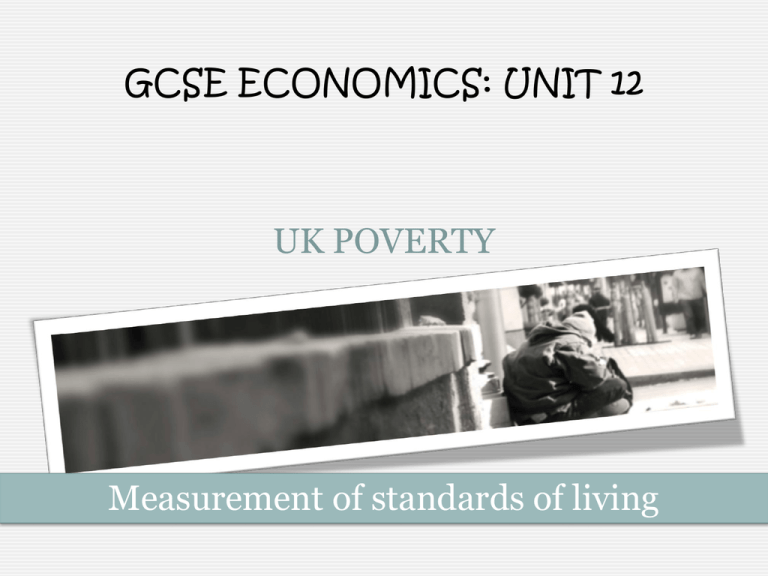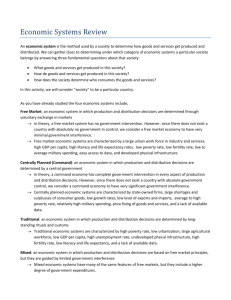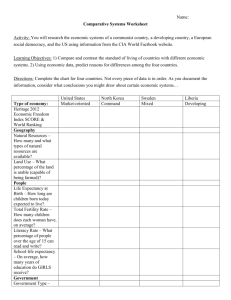Standards of living - Mr Tarn
advertisement

GCSE ECONOMICS: UNIT 12 UK POVERTY Measurement of standards of living SECTION 2 UK POVERTY Introduction UK Poverty... The 2nd Section of Unit 12 covers UK Poverty This section focuses on; - - the disparities (differences) in living standards - - the ethical issues that arise from the implications of choice for society The focus is on Poverty in the UK over the past 5 years SECTION 2 UK POVERTY Today you will... Identify how we measure standards of living Explain the different measurements of standards of living SECTION 2 UK POVERTY Standards of living... Someone who has a poor standard of living will tend to be classed as living in poverty and vice versa Standards of living refer to how well off an individual, group or country is at a point in time Measuring standards of living allow us as economists to compare individuals, groups and counties with each other now and over a period of time SECTION 2 UK POVERTY Standards of living... Who do you think has the highest standard of living in… 1. The Class 2. The King’s Academy 3. Middlesbrough 4. The UK SECTION 2 UK POVERTY How we measure it! There is no one measure of standards of living, however in the UK we often use the following; GDP per capita household income and wealth Level of education Standard of health. SECTION 2 UK POVERTY Measuring Living Standards: Real GDP per capita Q. What does GDP stand for? A. GDP stands for Gross Domestic Product Q. What does GDP measure? A. Real GDP measures the total amount of goods and services produced in the UK adjusted for inflation So what is Real GDP per capita….? Per capita means per head (per person) Therefore Real GDP per capita measures the total amount of goods and services produced per person adjusted for inflation SECTION 2 UK POVERTY Measuring Living Standards: Real GDP per capita GDP per capita adds up all the goods and services produced in the UK and divides it by the number of people in the population If GDP per capita increases then the UK population is said to have a higher standard of living Q. What might be the limitations of using GDP per capita to measure living standards in the UK? A. - National GDP hides regional variations (i.e. London versus the NorthEast) - GDP hides the unequal distribution of income and wealth across the UK population - Rising GDP may come at the cost of the environment (more pollution could mean poorer living standards e.g. Middlesbrough smog!?) - GDP per capita fails to take into account differences in the cost of living between regions - Rising GDP could be the result of the working population working longer hours giving up more and more of their leisure time - Hides the Black Economy and voluntary work SECTION 2 UK POVERTY Measuring Living Standards: Household income & wealth Living standards can also be measured by looking at household income and wealth Many economists argue that growth in median household incomes provides a better measure of how the standard of living has changed over time The median household income is the income of what would be the middle household, if all households in the UK were sorted in a list from poorest to richest • As it represents the middle of the income distribution, the median household income provides a good indication of the standard of living of the “typical” household in terms of income. SECTION 2 UK POVERTY Measuring Living Standards: Household income & wealth It follows that higher household income and wealth will mean higher standards of living because individuals and families will be to afford the goods and services deemed necessary for an acceptable standard of living The Joseph Rowntree Foundation have identified a minimum income standard (MIS) required to afford a minimum socially acceptable standard of living (link) As with previous measures of living standards, using averages can be deceiving e.g. cost of living differences between London and Middlesbrough will mean that the income required to have an adequate standard of living will be different in the two areas Another issue is that some people may receive benefits in kind. For example those on means tested benefits often receive prescriptions and dentist visits for free; therefore, their living standards are better than their actual income may suggest. SECTION 2 UK POVERTY Measuring Living Standards: Education & Health A person’s standard of living can also be defined by their level of education and health, or their access these basic services Q. How does a person’s level of health and education affect their standard of living though? A. With greater qualifications and improved health an individual has a greater earning potential; and therefore is able to afford the goods and services required to achieve a high standard of living SECTION 2 UK POVERTY Measuring Living Standards: General Problems Many indices are averages for the whole population of a country. This means that indices do not always reveal substantial inequalities between different segments of society. For example, a portion of the population of the UK could be living below the poverty line. In the data used in indices could be out of date or hard to collect. Some countries do not wish to have certain index data collected - for example, many countries do not publish statistics about the number of immigrants and migrants. GDP per capita and household incomes may both be rising but if the cost of living increases at a greater rate then standards of living could fall –indeed whilst economic growth and incomes have slowly risen, the high rates of inflation have squeezed budgets! SECTION 2 UK POVERTY Measuring Living Standards: Over to you Disposable incomes can be used as one measure of living standards Open and complete the ‘Standards of living’ from the student shared area




